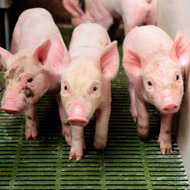
Farmers have five years to find alternative strategy
The UK government has confirmed the maximum transition period of five years for zinc oxide to support the adoption of alternative management strategies.
The Veterinary Medicines Directorate (VMD) said that it strongly encourages the responsible use of medicines during this time.
‘The VMD recognises the challenge that the withdrawal presents and is committed to finding ways to assist with the transition,’ it said in a statement. 'We will invite representatives of the pig industry to meet with us in the coming weeks to discuss implementation of the Commission Decision.’
On 26 June, the EC adopted a decision to withdraw the marketing authorisations (MAs) for veterinary medicines containing zinc oxide administered by mouth to food-producing species. Member States now have up to five years to withdraw existing national MAs for these products.
In the UK, there are three veterinary medicines authorised for oral administration to food-producing animals that contain zinc oxide. These are used in piglets for the prevention, or treatment and control, of diarrhoea.
But late last year, the European Medicines Agency (EMA) Veterinary Committee concluded that zinc oxide in piglet feed should be withdrawn, as the benefits are outweighed by the risk to the environment and co-selection of antimicrobial resistance.
The VMD said there are a limited number of vaccines authorised within the EU for the prevention of diarrhoea in piglets. These are indicated for specific pathogens.
There are also a number of antibiotics that are authorised for treatment, or for prevention and treatment, of specific causes of diarrhoea in piglets. For more information, refer to the Product Information Database.



 The Veterinary Medicines Directorate (VMD) is inviting applications from veterinary students to attend a one-week extramural studies (EMS) placement in July 2026.
The Veterinary Medicines Directorate (VMD) is inviting applications from veterinary students to attend a one-week extramural studies (EMS) placement in July 2026.